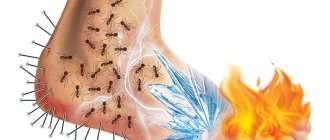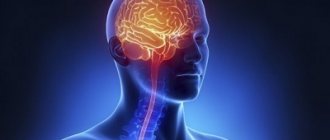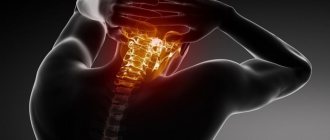Description of other types of diseases starting with the letter “T”: Toxic encephalopathy; Torsion dystonia; Traumatic encephalopathy; Peripheral nerve injuries; Transient global amnesia; Transient ischemic attack; Cavernous sinus thrombosis; Tuberculous meningitis; Brain tuberculoma; Tuberous sclerosis.
Memory loss is a fairly common disorder that can last for varying periods of time. If a person is in such a state for no more than a day, it is customary to talk about transient global amnesia.
It is important that despite the lack of memories and disorientation, the patient retains full awareness of his own personality. In this regard, no specific therapy is carried out to treat the disease. The main task of doctors is to detect internal or external factors that influenced the patient and caused the loss of memories.
general characteristics
Transient global amnesia (hereinafter referred to as TGA) is a transient memory disorder. This is due to the fact that an attack of the disease usually takes 2-3 hours. The maximum duration of a person's stay in oblivion should not exceed 24 hours.
Most often, the attack is one-time and affects people aged 50 years and older. If the attack is repeated again, this can already be dangerous, since in this case the disorder becomes persistent.
Statistically, TGA is a rare form of memory loss. Its incidence is about 5 cases per 100,000 people. However, experts are actively studying this disease, since it can signal the presence of serious problems in the human body, including vascular pathologies and malignant tumors. In some cases, short-term memory loss is a sign of brain cancer.
Clinics for treatment with the best prices
Price
| Total: 175 in 16 cities |
7(812) 559-50-86
7(812) 670-55-82
7(812) 655-89-27
St. Petersburg (m. Ozerki)—23671ք(80%*) St. Petersburg State Medical University named after. I.P. Pavlova7(812) 429..show 7(812) 429-03-337(812) 429-03-31 St. Petersburg (metro Petrogradskaya)—30840ք(80%*) Be healthy in the Last Lane 7(495) 782..showRecord
7(495) 782-88-82
7(495) 663-03-03
Moscow (metro station Sukharevskaya) 34805ք(80%*) Road Clinical Hospital of JSC Russian Railways 7(812) 679..show 7(812) 679-70-03 St. Petersburg (metro station Ploshchad Muzhestva)—40200ք(80%* ) CELT on Entuziastov Highway 7 (499) 969..showRecord7(499) 969-26-53
7(495) 788-33-88
Moscow (metro Shosse Entuziastov)42830ք(80%*) Federal Medical Research Center named after. V.A. Almazova7(812) 702..show 7(812) 702-37-067(812) 702-37-03
7(812) 702-51-91
St. Petersburg (m. Udelnaya)—44615ք(80%*)European Clinic in Dukhovsky Lane 7(495) 125..showRecord7(495) 125-22-36
7(495) 256-04-98
Moscow (metro station Tulskaya)80730ք(80%*)European MC in Orlovsky lane 7(495) 969..showRecord7(495) 969-24-37
7(495) 933-66-55
7(495) 933-66-59
Moscow (metro Prospekt Mira)197650ք(80%*)European MC on the street. Shchepkina7(495) 969..showRecord7(495) 969-24-37
7(495) 933-66-55
Moscow (metro station Prospekt Mira)218471ք(80%*)* - the clinic does not provide 100% of the selected services. More details by clicking on the price.Causes of the disease
For a very long time, doctors could not understand why short-term memory loss occurs. Modern diagnostic methods such as PET, MRI and duplex scanning have helped us get closer to the answer to this question. It was during these procedures that it became clear that during an attack of TGA, changes were observed in the hippocampal area of the brain.
Today, doctors offer 2 theories to explain the occurrence of short-term amnesia:
- TGA is an epileptic phenomenon that appears due to short-term activity of the epifocus in the brain, namely in the hippocampus.
- TGA is a specific type of transient ischemic attack. This means that the causes of amnesia lie in poor blood supply to the hippocampus and nearby structures.
To complicate matters, amnesia is often a comorbid condition for more serious health problems. For example, it appears in the background:
- cerebral ischemia;
- subarachnoid hemorrhage;
- severe form of diabetes mellitus;
- traumatic brain injury;
- migraine;
- cancerous tumors;
- hypertensive crisis.
In rare cases, memory loss is caused by external factors. This may be due to severe stress, exposure to extreme conditions (for example, cold water) or too much physical activity. However, in such situations it is easy to determine what exactly provoked the attack, so they are not difficult for the diagnostician.
Symptoms of TGA
As with other forms of memory loss, the patient suddenly stops remembering information about what is happening to him. Additionally, the so-called retrograde amnesia manifests itself: a person cannot remember any events from the past, no matter how long ago they occurred.
The particular danger of an attack is that it occurs suddenly and without any symptoms. Only in some patients did the attack begin after a migraine or a sharp increase in blood pressure; in all other cases there were no provoking factors. The patients simply instantly lost all their memories, but remained conscious.
Among the main signs of TGA are the following:
- loss of spatiotemporal orientation;
- preserved speech, thinking, logic, other cognitive functions and social skills;
- the ability to recognize familiar faces and full awareness of one's personality.
A person remembers exactly who he is and is able to distinguish close people from everyone else, but at once loses all memories, even of what happened just a few seconds ago.
Since the patient fully understands that something incomprehensible is happening to him, he usually looks lost and frightened. Such a patient may ask others a huge number of questions, trying to determine what happened. However, the answers do not linger in the victim’s memory, and he instantly forgets them, so he asks the same thing over and over again.
In 35% of patients, along with the loss of memories, there is a failure of higher nervous functions. Similar symptoms include:
- mild motor aphasia;
- inability to recognize familiar objects (visual agnosia);
- automatic and undirected movements;
- disruptions in auditory perception.
A special form of TGA is partial amnesia. In this case, memory loss is associated exclusively with work activities. At the same time, a person is able to reproduce information about current and past events not related to his work without any problems.
After some time (usually after 2-5 hours), the patient’s memory gradually begins to return. First, nervous functions are restored, then long-term memories are restored. Against this background, the patient feels an improvement in overall health. Afterwards, doctors can only wait until short-term memory returns to order.
The duration of the attack ranges from 30 minutes to 24 hours. It is interesting that often the patient is not able to remember what exactly happened to him during the attack. All other memories are usually fully restored.
Description
Transient global amnesia. Transient memory impairment for current and past events lasting up to a day. Accompanied by loss of orientation while maintaining consciousness of one's own personality. Some temporary disturbances of higher nervous functions are possible. Diagnosis includes a neurological examination, EEG, MRI, duplex scanning of cerebral vessels; if necessary, PET scan of the brain. It is necessary to exclude acute vascular pathology of the brain, epilepsy and intracerebral tumor. There is no specific therapy yet. The underlying pathology is treated; according to indications - psychotherapy.
Carrying out diagnostics
If the attack of amnesia was one-time and lasted no more than a day, the neurologist must conduct a conversation with the patient to clarify the medical history. In 25% of cases, according to statistics, before an attack of TGA, patients experienced paroxysmal conditions (hypersomnia, fainting, severe migraines, epileptic convulsions, etc.). However, in most victims no neurological problems are identified.
If a person is taken to the hospital during an attack, the first step is to exclude acute vascular pathology. Symptoms of TGA are similar to the condition during subarachnoid hemorrhage and hemorrhagic stroke, which are life-threatening.
Instrumental methods
Only an emergency MRI of the brain can help make an accurate diagnosis. If it is memory loss that occurs, and not other of these pathologies, signals of increased intensity will be observed in the hippocampal area. If the patient is examined after an attack, an MRI is still given to him. This allows us to exclude a cancerous brain tumor.
Another method used to diagnose TGA is electroencephalography. In conclusion, in the case of genuine amnesia, an increase in bioelectrical activity in the alpha-2 and beta-1 ranges will be recorded. The use of this device allows you to exclude episyndrome, which requires drug treatment and observation by a specialist.
Finally, patients are recommended to undergo transcranial Doppler ultrasound. The procedure will reveal changes in the blood vessels of the brain that are associated with the patient’s advanced age. Sometimes it is the aging process of the body that provokes neurological abnormalities, including memory loss.
Is it possible to completely recover from amnesia attacks?
Since doctors have not yet been able to determine whether TGA is a consequence of ischemia or epileptic activity, there is no clear approach to treating the disease. The most effective option is one in which background deviations are stopped. In this case, the patient takes the following types of drugs:
- neuroprotective;
- vascular;
- anticonvulsants;
- antimigraine.
If a brain tumor is detected during the examination, therapy is subsequently carried out under the supervision of oncologists and neurosurgeons. In this case, surgical intervention is often required, since medications alone will no longer be enough.
Additionally, you may need to consult a psychologist or psychotherapist who will help you cope with the consequences of the shock you suffered.
Forecast
During an attack, no medical measures are usually carried out. As a rule, the symptoms of the disease go away on their own. Events of the past are again restored in memory, with the exception of the time when the patient was in a state of amnesia.
The prognosis of the disease in most cases is favorable and the likelihood of recurrent attacks is low.
When treating the disease, measures are taken to exclude cerebral ischemia. For this purpose, MRI (magnetic resonance imaging) and CT (computed tomography) are performed. In addition, a general blood test is examined for coagulation. If epilepsy is suspected, an EEG (electroencephalogram) is used. Subsequently, treatment of the pathology identified during the study is undertaken.
The prognosis of TGA depends on the underlying pathology against which the episode of amnesia occurred. Relapses are rare - with a frequency of 3% per year. They are dangerous due to the formation of persistent mnestic disorders up to the development of Korsakoff syndrome. Prognostically, the most unfavorable cases of TGA that arise as a result of a tumor process.
Medical prognosis
It is impossible to say immediately how effective TGA treatment will be. To answer this question, you will first have to identify the main pathology that provoked the memory loss.
Repeated cases of sudden and short-term memory loss can already be dangerous. According to statistics, relapses occur in only 3% of patients, but they do not end well for the patient. A stable form of memory impairment may develop, sometimes even Korsakoff syndrome.
The most unfavorable situations for the patient are those when the loss of memories is associated with the presence of a malignant tumor in the brain. In other patients, cerebrovascular accidents are considered possible complications. This provokes conditions such as vascular dementia, PNMC or ischemic stroke.











